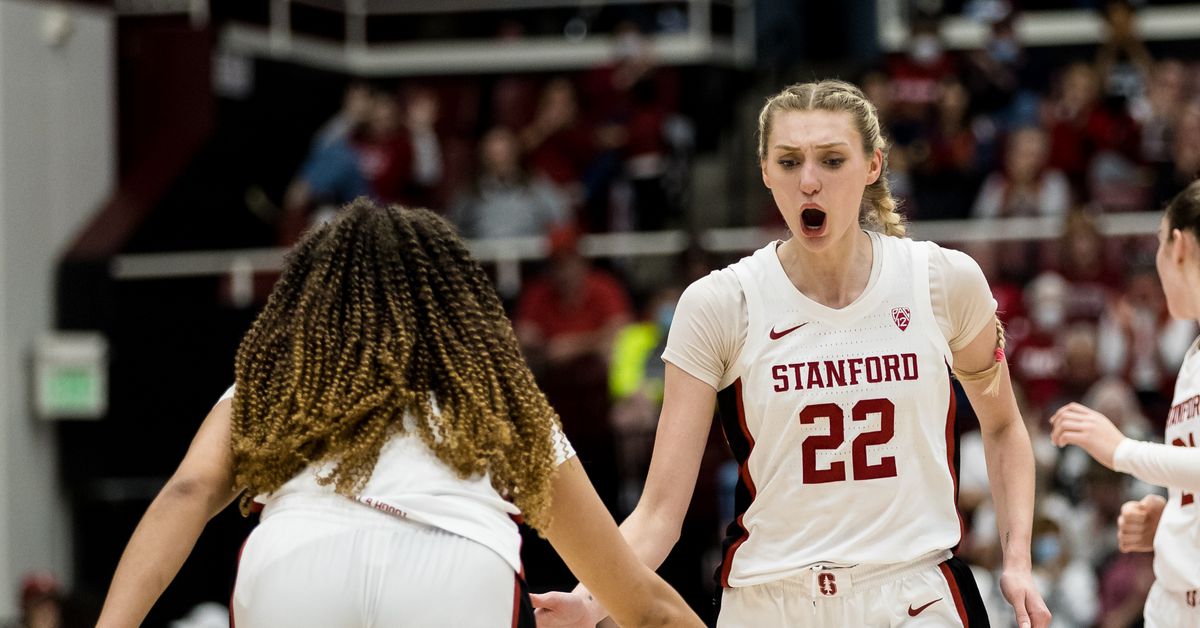To say UConn has gone through it this year is an understatement.
They have played the nation’s most demanding schedule while battling a steady stream of injuries that have been unceasing since last summer. First, All-American Paige Bueckers tore her ACL, after which star guard Azzi Fudd hurt her knee – twice. Starter Caroline Ducharme missed 12 games in concussion protocol. Starter Dorka Juhasz broke her thumb.
Only two players – Aaliyah Edwards and Lou Lopez-Senechal – have started every game. Pre-season Naismith candidate Fudd (still their leading scorer) has played just nine games. She may or may not return to play this season. Ducharme played her first game of 2023 just this week.
The team was so injury-depleted that they had to postpone the Jan. 8 game against DePaul because they could not dress seven players, as required by the Big East Conference.
Despite all that, the Huskies looked great up and through their close loss to South Carolina on Feb. 5, a game which could have finished differently with better officiating.
But everyone has known for a month that the team was exhausted. After a stretch of five games in 12 days spanning January into February, coach Geno Auriemma said, “I’m not surprised that as the games have gone on, it’s become increasingly difficult to stay ‘up,’ and to be mentally sharp.”
The brutally physical game against the Gamecocks followed just four days after that 12 game stretch. UConn held it together for most of that game, and nearly mounted a comeback victory.
After that high-adrenaline contest, fatigue seems to have hit the team as a whole. In a loss at Marquette (the Huskies’ first back-to-back losses in the previous 1,083 games), a team that had averaged better than 80 points per game and shot over 50 percent on the season managed just 52 points and 40 percent.
In the next matchup, 12-12 Georgetown cut a 14-point lead to four in the final period, but UConn made their late free throws to hold on for a worrisome victory.
Next, Creighton led the Huskies by 11 points entering the fourth quarter. Ducharme, in her first game back, scored all 10 of her points in the fourth quarter to pull out a two-point, last-second comeback. UConn scored just 62 points on 38 percent shooting. In their first meeting, the Husky defense held Creighton to 24 percent from the floor. This week, the Bluejays managed 38 percent.
In seven games since Jan. 26, point guard Nika Muhl has played all but three of 280 minutes. Lopez-Senechal has rested for 15 total minutes in six of those games (foul trouble limited her to 22 minutes in the other). In the six games before Creighton, Aubrey Griffin had 15 minutes off the court, and two games with 40 minutes. In those same six games, Juhasz sat for seven minutes. Edwards has played 38 or more minutes in five of the seven.
The mantra has been that the team’s exhaustion is inevitable, because they have a “short bench.” True, they have just three (now, four, with Ducharme) bench players.
But it is also true that those bench players have spent most of their time idle while the starters played on fumes. That decision, and the diminished play of the team lately, falls squarely on the coaches’ shoulders.
Auriemma is arguably the greatest college basketball coach of all time. He is certainly the most successful, with an unmatched 11 National Championships, 1172 wins (2nd to Stanford’s Tara Vanderveer) and an .861 winning percentage. His teams have always appeared prepared for the biggest challenges of an always-challenging schedule.
Players who come to UConn and stay for four years almost always improve their play in significant ways. Muhl, Juhacz, Edwards, and Griffin are all playing dramatically better than ever this season. Their coaches deserve much of the credit for that.
Auriemma’s history of player development has been based (to be simplistic) on uncompromising insistence that athletes play a high level of focus and effort if they want to see court time. And it has worked remarkably well. The WNBA is filled with players Auriemma has mentored, and all of them improved significantly while under his tutelage.
But this is a season like no other in terms of injury. “Uncompromising” is not always appropriate. Auriemma’s failure to use his bench to give his starters much-needed rest has clearly been a major factor in their sub-standard performances in three games since the South Carolina loss.
Athletes need recovery time. Anyone who has trained and competed at a high level, as I have, knows this. Exhaustion affects every aspect of an athlete’s performance, mentally and physically.
This Husky team has needed rest and recovery all season. They seem to be crashing now, at a time when they historically peak.
But here’s the rub: the “short” bench has been short largely because it has been unused. The starters all have averaged 32 or more minutes per game, and perhaps not coincidentally, are missing shots they usually make. They are a tiny bit slower on defense, and are turning the ball over more often – and in more damaging ways. As a result, they are at risk of losing games they would have won easily in January.
Yet some some very solid, though young, players sit on that unused bench.
Ines Bettencourt showed herself to be a capable, and reasonably-poised, point guard when forced to start for Muhl. She has not been a part of the rotation, playing essentially only in blowouts.
Ayanna Patterson, an active, athletic defender and rebounder, has played an average of 11.3 minutes, but mostly when Edwards or Juhasz have been in foul trouble.
Amari DeBerry, is by height a post player, but her athleticism makes her more versatile than that. She is shooting .500 overall and .417 from three, with 38 rebounds and 15 blocks, and is more than capable of defending the perimeter at 6-5. But she has played just 9.2 minutes on average, and only 17 total in the last five games. (To be fair, DeBerry also has averaged a foul every six minutes.)
These players have been available most of the season to give the five starters a break. Do they perform at the same level as those for whom they would substitute? Of course not. That’s why they are bench players. But all three have been underused even when the playing-time toll on the starters has become obvious.
After the Marquette loss last week, Auriemma seemed to recognize the error of so many minutes for so few players.
“There is no stopping it,” he said. “The only thing you can do is try to minimize how much you’re on your feet and try to save everything for game day. We’re at that point in the season where the only recourse might be, we’re going to have to rest some guys and suffer whatever consequences happen.”
But, somehow, the coach cannot get himself to do just that. He has never been that person: one who might sacrifice a game in front of him for something down the road. He has, in fact, played a very short rotation for many years, and has been extremely lucky. But this season, it all caught up with him and the team, and he is still unwilling to bend – to go outside of the box.
Against Georgetown, Patterson played 12 minutes, mostly because Lopez-Senechal was in foul trouble. Bettencourt and DeBerry played eight minutes combined. Against Creighton, the three played no minutes. Muhl, and Edwards played 40 each, and Lopez-Senechal, 39.
When associate cead coach Chris Dailey took over for an ailing Auriemma for several games this season, those three bench players were used early and often. Patterson played double-digit minutes in those games, even without other players in foul trouble. DeBerry played extended minutes, as did Bettencourt, and the team held its own. UConn won each of those contests.
We have no way of knowing whether these players have failed to meet Auriemma’s practice standards. It seems likely that they have not, or we would have seen them in action more often. But while Auriemma’s standards have made many good players great, his inflexibility may have permanently damaged this fatigued team.
Surprisingly, when asked on Friday about the issue, Auriemma did not staunchly defend his decision to bench his bench.
“There’s a lot of factors that go into that,” he said. “You know, each game we go into I want to do it, and I keep talking to them about it.”
“Some of it is, two of them are freshmen, and they’re not they’re not comfortable in some of these games. Some of it is, in our league they don’t play with a five-man. So it’s hard to get some of our post players in the game because we don’t know what to do with them defensively.”
Auriemma said there was a rationale behind his decision.
“Most of the time that we play, since all of our injuries, our biggest problem is not been defense, but it’s been scoring. And none of those guys bring scoring off the bench,” he said. “So yeah, I need to do a better job going down the stretch now, of just trying to get them into the game for the sake of getting them into the game.”
Could it be that Auriemma is blind to DeBerry’s defensive length and her high-percentage success when allowed to be a scorer? Has he missed what a great rebounder Patterson has been? Did he not see Bettencourt step up when forced to be the starting point guard at Maryland? It seems unlikely, but still, they do not play.
If the bench had seen more minutes this season, would the starters still be sharp? Would the reserves have improved enough to be regular contributors if they had more game play? Will all this matter when a tired Husky team has to play three games in three days in the Big East Tournament, just two weeks from now? It looks like it might.














